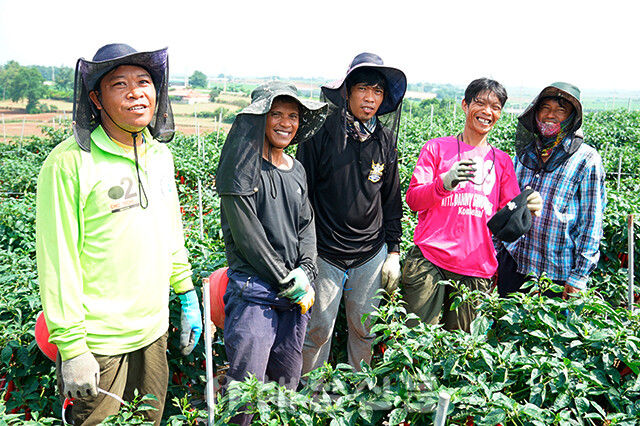
SEOUL, South Korea – The exploitation of foreign seasonal workers in South Korea by illegal brokers is a rampant issue demanding urgent reform, according to Regina Dinamling Bitabiet, 51, head of the Yongin Filipino Migrant Workers Community (YFMWC). In a recent interview with Yonhap News, Bitabiet, a Filipino marriage migrant who settled in Korea 25 years ago, stressed, "We've been grappling with this issue for five years, but a solution remains elusive." She emphasized that "many workers complain of difficulties due to wage arrears and broker problems."
Bitabiet, who resides in Yongin, Gyeonggi Province, dedicates her efforts to supporting Filipino migrant workers in Korea. Her tireless work over two decades protecting the human rights of migrants was recognized last year with the 'Minu Award.' The Minu Award, established in 2020 by 'People Who Love Minu' – a group of migrant worker activists – honors Minu Moktan, a Nepalese worker regarded as an icon of the migrant labor movement in Korea.
Driving Change Through Advocacy and Monitoring
Bitabiet's advocacy has already yielded significant results. Through her meticulous investigations and monitoring, she prompted the National Human Rights Commission of Korea to recommend improvements to the seasonal worker program. Her efforts also led the Philippine Department of Migrant Workers (DMW) to issue an administrative order to suspend the dispatch of seasonal workers through illegal broker intervention. These actions underscore her pivotal role in bringing systemic issues to light and pushing for official responses.
Currently, Bitabiet continues her counseling and monitoring activities for Filipino migrant workers in Korea, tirelessly working to prevent illegal broker involvement. Her consultations have uncovered disturbing incidents, including brokers threatening migrant workers late at night. She revealed that in some areas, such as Haenam, Goheung, and Sinan in South Jeolla Province, illegal brokers are rampant, demanding excessive fees and even confiscating passports. "The Ministry of Justice's response is limited to contract termination, which lacks fundamental solutions," Bitabiet pointed out, highlighting the inadequacy of current measures.
The Pervasive Issue of Brokerage Fees and Impunity
Bitabiet detailed the severe financial exploitation faced by workers: "Illegal brokers sometimes take half of a seasonal worker's monthly salary." She explained the lucrative nature of the illicit trade, stating, "If one broker recruits 10 workers, they can rake in 10 million won in profit. During the COVID-19 pandemic, it was even revealed that Korean nationals in the Philippines were involved."
The challenges for affected workers extend beyond financial losses. "Even if they report the damages, it's difficult to raise issues because they have to return home after their contracts expire in three to five months," she lamented. The complexities are further compounded by alleged collusion: "The Philippine government has the will to resolve this, but there are also issues of collusion between some officials and brokers, making it complicated."
Call for Bilateral Cooperation and Continuous Monitoring
Bitabiet urged both governments to step up their efforts: "Many seasonal workers come to Korea from the Philippines but find themselves in vulnerable and disadvantaged situations." She called for "the Philippine Department of Migrant Workers and the Korean government to cooperate to prevent broker involvement and continuously monitor the situation of migrant workers." This collaborative approach is crucial for creating a safer and more equitable system.
The Minu Award has amplified her platform, leading to an increase in requests for assistance. "Since receiving the Minu Award, more people have asked for help, which is a positive sign," Bitabiet shared. "I felt that we are working together to create an inclusive and warm society through those who step forward to help migrants." She candidly admitted that she never dreamed she would become a voice for Filipino migrants. Her migrant support activities began from a genuine desire to help others navigate the challenges she herself experienced in Korea.
Improving the Filipino Household Helper Pilot Program
Bitabiet also offered suggestions for improving the 'Foreign (Filipino) Household Helper Pilot Program,' which the Korean government recently decided to extend for a year. The full-scale implementation of the program, originally scheduled for June this year, was postponed due to high cost burdens and low demand.
Drawing parallels to the seasonal worker program, Bitabiet highlighted the reality that broker fees, accommodation, and food expenses are often deducted from the household helpers' salaries. She proposed, "Accommodation and food expenses should be provided free of charge to household helpers." This, she believes, "will allow household helpers to work with more focus and without worry, ultimately providing greater assistance to the employing households." She expressed optimism that the success of this program would have positive effects for citizens of both nations.
A Vision for an Inclusive and Respected Migrant Community
Bitabiet's ultimate goal is to empower migrants to thrive in Korean society. "I help migrants find stable and comfortable jobs, counsel them, and share various information," she explained. "Beyond simply receiving help, I want to create continuous change." She added, "Our goal is to ensure migrants are welcomed and respected in Korean society and can demonstrate their capabilities. We are working to raise awareness, implement policy changes, and establish a strong support system."
Her ongoing efforts reflect a deep commitment to ensuring that migrant workers are treated with dignity and fairness, a crucial step towards building a truly inclusive society in South Korea. The challenges are significant, but advocates like Bitabiet continue to push for systemic reforms that protect the rights and well-being of all who contribute to the Korean economy.
[Copyright (c) Global Economic Times. All Rights Reserved.]






























